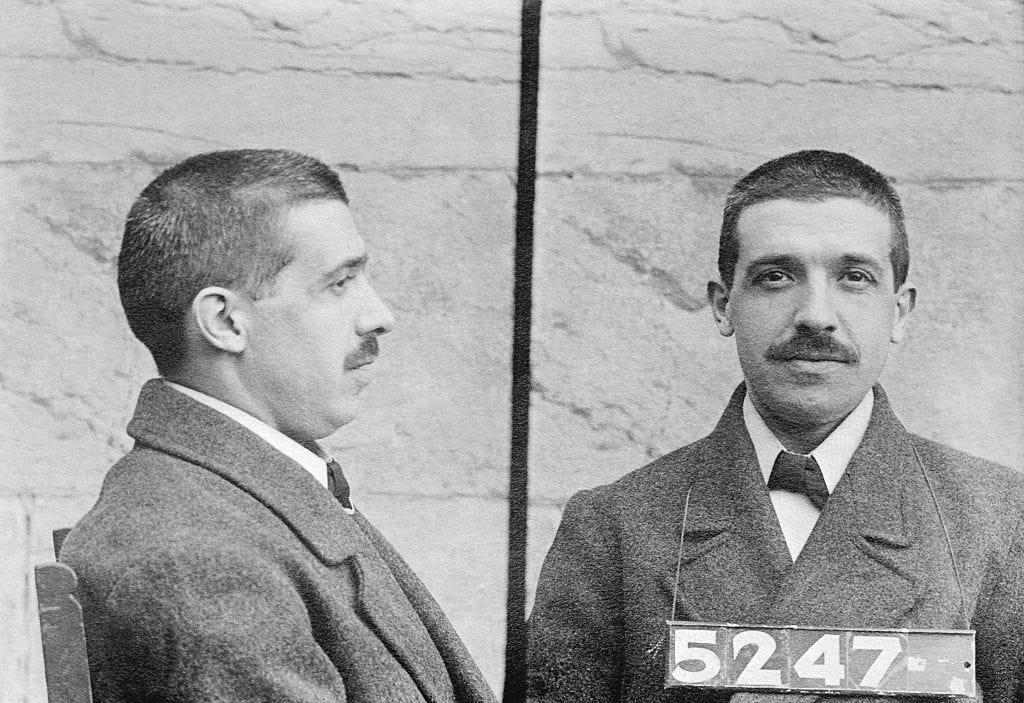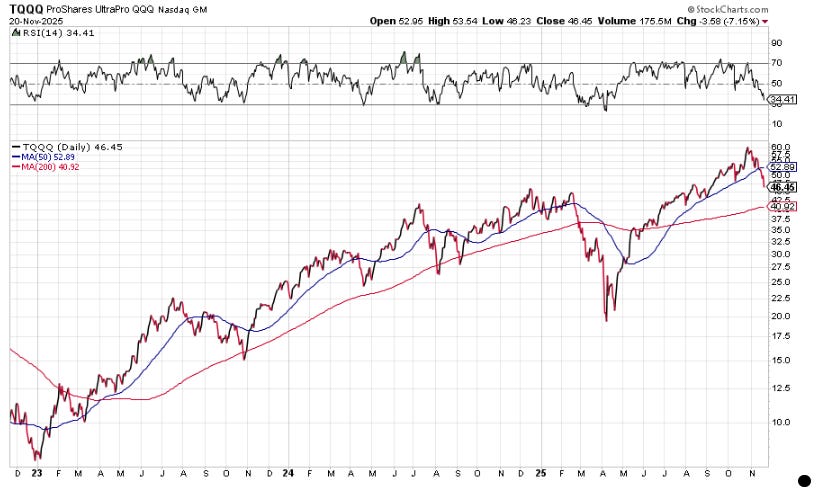Everybody loves a Ponzi
The trouble with history is that it is unforgiving. Like double entry bookkeeping, for every credit, there’s a debit. Attached to every rise is a fall. You can’t get one without the other.
Friday, November 21st, 2025
Bill Bonner, from Baltimore, Maryland
‘Perhaps there is still time to defeat history.’
Daniel Oliver
Mr. Oliver must be an unreconstructed optimist. An un-mugged Democrat. A man enjoying his first vote…or his second marriage.
The history he is referring to is the one we know so well. It is the history of booms and busts…and of great nations laid low by the ‘fatal conceit’ of their leaders.
All bubbles burst.
All paper currencies become worthless.
All empires decline and fall.
it is a repeatable, predictable, investable history – at least to some extent. That is, the actual course of future events – as determined by chance, ideas, culture and technology – is completely unknowable.
After all, who could have foreseen that a Serbian anarchist would have lit the fuse on the most devastating blow-up in human history…a war in which the most advanced nations on the planet fought to the death? The combatants had little to gain. And yet, they went at each other hammer and tongs…for four long years.
And at the end of it, England and France were bankrupt. The Austro-Hungarian Empire was kaput. The House of the Hohenzollern was finished in Germany. And in Russia, the Tsar and his family were killed and a crackpot new creed – communism – took root.
But human action – the sturm and drang of human emotions…the cycles of greed and fear…and the pattern of life itself…from its promising beginnings to its inevitable decline and fall…blockheadishness, envy, fightin’ spirit, innovation…angels and devils --you can count on them all. They leave the footprints we know as ‘history.’ Follow them, if you can.
The trouble with history is that it is unforgiving. Like double entry bookkeeping, for every credit, there’s a debit. Attached to every rise is a fall. You can’t get one without the other.
But let’s keep an open mind. The most glaring and immediate challenge for investors is the AI bubble. Moneywise:
With U.S. stocks powering higher, enthusiasm is running hot. But billionaire hedge fund manager Paul Tudor Jones says today’s environment is giving him flashbacks to the dot-com boom — and not in a warm, fuzzy and nostalgic way.
The historical pattern is undisputed.
As more money is ‘invested’, prices rise. Investors’ gains go up. This draws in ‘momentum’ investors…and the returns go higher. So far this year, the Nasdaq has gained 28%. If you had borrowed at 5%, you’d have a 23% gain on money that you never earned or saved.
Everybody loves a good Ponzi! As it draws in more money, the excitement grows. The ‘investment’ becomes more profitable…more attractive…and appears less risky (everybody’s doing it!).
And today, the CAPE ratio (cyclically adjusted price earnings) has only been at this level once before…in 1999. What next? As to the Ponzi scheme that doesn’t collapse,’ history is silent. There are none on record.
Busts trail behind bubbles…like alimony payments behind a runaway husband. The only exceptions are theoretical. Output could catch up. Then, there may be no need for a correction to return to a more normal price/earnings ratio.
But it has never happened. Not with the promise of the ‘20s – internal combustion engines and electrical appliances. Nor with the promise of the ‘60s – the Nifty Fifty market dominators. Nor with the promise of the ‘90s – the dot.coms. Each time, there were successes…but not enough to avoid a broad market sell-off.
And this time, can AI pay off enough so that the markets ‘defeat history’ by not falling? ChatGPT tells us that the total invested in AI is around $1.5 trillion. Palantir, which uses AI to keep tabs on people, is selling for more than 100 times sales…and 400 times earnings. At those levels, it is not an investment; it’s a pure speculation. You are betting that other speculators will come in with more money…lifting the price even further.
In order to be a solid investment at a decent price, the company would have to increase output (earnings) by 30 times. That is what it would take to get to a ‘sustainable’ P/E. And, again, search the historical record all you want. You will find no substantial company that has ever done it.
A tiny start-up can have dramatic growth in profits, sales, and its stock price; but not a company already valued at nearly half a trillion dollars. Even Apple, one of the most successful corporations in history, grew its sales by only 4x over the last 15 years.
What history shows is that normalcy is more likely to be achieved by a sharp fall in the price…rather than a spectacular rise in earnings.
Defeat history? We wouldn’t count on it.
Regards,
Bill Bonner
Research Note, by Dan Denning
Can an interest rate cut save stocks from a momentum sell-off? The odds of a December rate cut jumped from 40% to 70% earlier this morning when New York Fed President John Williams suggested a rate cut at the Fed’s December 9-10th policy meeting might be ‘warranted.’ The Fed will have almost no employment or macro economic data from the month of October to rely on.
Meanwhile, yesterday’s 3.5% reversal on the S&P 500, from a 1.9% gain to a 1.6% loss—was the largest since April (3.8%). The chart above shows the price performance of the ProShares Ultra Pro QQQ fund [TQQQ], the largest leveraged ETF (by market cap) a trader can buy. It’s a $30 billion ETF that promises to 3x the performance of the Nasdaq 100—so basically large cap tech/growth stocks.
Bitcoin’s had its biggest drop in three years. Stocks, their biggest weekly slump in seven months. Last time momentum and growth got ‘repriced’, TQQQ fell 57% peak-to-trough. If leverage breaks down and margin calls go out, look for the chart above to get worse. More on that later today in my research note to paying subscribers.




Just goes to show that when Bonner writes a column on financial stuff, he can do a good job, as opposed to the deranged lunatic he appears to be when he writes anything about Trump.
It would be nice if CONgress could pass a law telling the Fed Banksters to shut up about what they might do in the future. Stooges like Williams talking about what the Fed might do are a great source of corruption - e.g., Johnnie the Bankster tell friends and family -I'm going public today with a comment about cutting or raising rates in December, invest accordingly. But isn't it ironic that so many politicians who rail against socialism and communism have no problem with a Central Planning Committee having so much power?